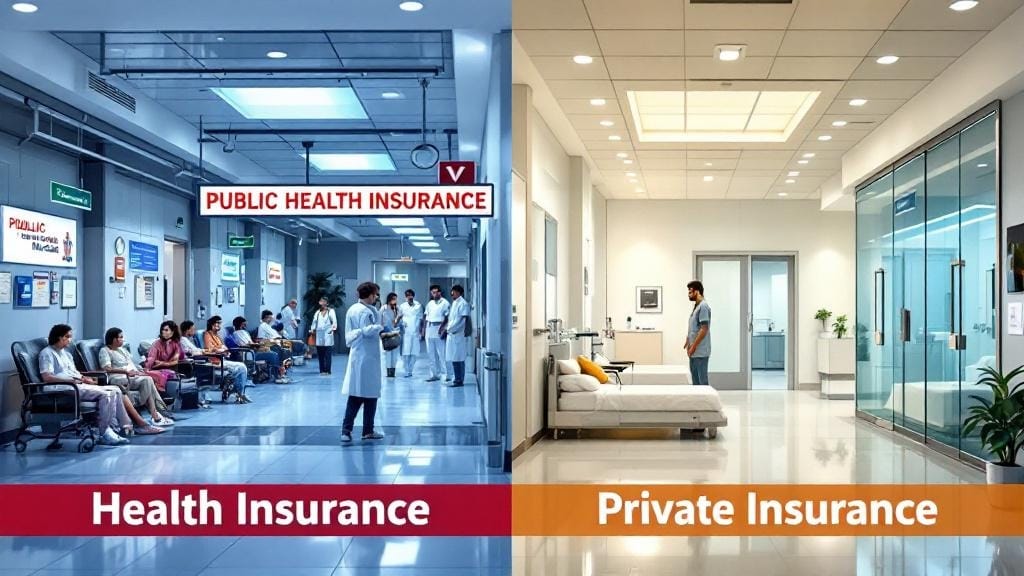Health insurance is a crucial part of modern-day healthcare, offering financial protection against unexpected medical expenses. However, with various options available, it can be overwhelming for consumers to decide between private and public health insurance. In this article, we’ll explore the differences between private vs public health insurance, highlight the top 10 health insurance companies with high claim ratios, and offer insights into the benefits of both types of health insurance.
What is Private Health Insurance vs Public Health Insurance?
Before we dive into the specifics, let’s clarify the fundamental differences between private and public health insurance.
Private Health Insurance
Private health insurance is provided by private companies and is usually purchased individually or through an employer-sponsored plan. Private health insurance providers offer a variety of plans, often with more flexibility in terms of coverage options, networks of hospitals, and additional benefits. However, private healthcare plans can be more expensive due to higher premiums and out-of-pocket expenses.
Benefits of Private Health Insurance:
Greater flexibility and a wider range of healthcare providers.
Access to premium healthcare services.
Quicker treatment and reduced waiting times.
Customizable coverage with additional benefits like dental, vision, and mental health services.
Public Health Insurance
On the other hand, public health insurance is funded and managed by the government. It provides healthcare coverage to a larger section of the population, typically at a more affordable rate. In countries with universal health insurance, public health insurance often covers essential healthcare needs, though it may have restrictions in terms of treatment options and waiting times.
Benefits of Public Health Insurance:
Lower premiums or government-subsidized health plans.
Universal healthcare coverage, ensuring no one is left out.
More comprehensive access to basic medical services.
Affordable public health insurance options for low-income families.
Now that we’ve established the key differences, let’s delve into the top 10 health insurance companies with high claim ratios.
Top 10 Health Insurance Companies with High Claim Ratios
A claim ratio is a key indicator of how well an insurance company settles claims compared to the premiums it collects. A high claim ratio typically reflects that the company is paying out a larger percentage of premiums in claims, which could be a sign of customer-friendly policies. Here are the top 10 health insurance companies that boast high claim ratios.
1. Star Health and Allied Insurance
Star Health is one of the private health insurance providers known for its high claim settlement ratio. With an extensive network of hospitals, Star Health offers a wide range of health insurance plans, including plans for families, senior citizens, and individuals with chronic diseases.
Claim Ratio: 85% (approx.)
Key Features:
Covers pre-existing diseases after a waiting period.
Offers maternity benefits with a waiting period.
Provides cashless hospitalization in over 9,900 hospitals.
2. Max Bupa Health Insurance
Max Bupa is a prominent player in the private healthcare plans sector, with a focus on customer satisfaction and smooth claim settlement processes. They offer a variety of comprehensive health plans, including coverage for critical illnesses and wellness programs.
Claim Ratio: 94.4%
Key Features:
No age limit for entry in senior citizen plans.
Offers a health insurance comparison tool on their website.
Provides cashless treatment in over 4,500 hospitals.
3. Religare Health Insurance (Care Health Insurance)
Religare Health Insurance, now known as Care Health Insurance, is another private insurer with a strong claim settlement ratio. The company is known for its health insurance policy differences, with plans designed to suit diverse needs, including personal and family floater plans.
Claim Ratio: 91.3%
Key Features:
Affordable premium plans for individuals and families.
No capping on room rents.
Provides coverage for maternity and newborn babies.
4. New India Assurance
As a public health insurance provider, New India Assurance offers reliable health insurance plans backed by the government. While it may not offer the same flexibility as private insurers, it provides affordable premiums and comprehensive coverage for families and individuals.
Claim Ratio: 94.7%
Key Features:
Wide range of health insurance policies.
Government-subsidized health plans for rural and low-income families.
Cashless hospitalization in thousands of network hospitals.
5. HDFC ERGO Health Insurance
HDFC ERGO is a leading private health insurance provider in India with a solid reputation for high claim settlement ratios. Known for offering affordable health insurance, this company has a wide network of hospitals for cashless claims.
Claim Ratio: 97%
Key Features:
Offers both individual and family floater health plans.
Offers government health insurance plans with affordable premiums.
24×7 customer support for claims and assistance.
6. Bajaj Allianz General Insurance
Bajaj Allianz is another private health insurance provider with a strong claim settlement record. Their health insurance plans offer a range of options, from basic coverage to comprehensive critical illness and maternity packages.
Claim Ratio: 95%
Key Features:
Network of over 6,500 hospitals for cashless treatments.
Provides health insurance plan types like individual and family floater plans.
Offers wellness benefits and health check-ups.
7. ICICI Lombard General Insurance
ICICI Lombard is one of the most well-known private health insurance providers, offering a variety of health insurance plan types to cater to different segments of society. Their claim settlement ratio and customer service are highly regarded in the industry.
Claim Ratio: 94%
Key Features:
Offers cashless hospitalization in more than 4,500 hospitals.
Provides coverage for critical illness and chronic diseases.
Affordable premiums with a range of add-on covers.
8. SBI Health Insurance
The State Bank of India (SBI) offers both private and public healthcare coverage options, providing comprehensive health insurance plans at competitive prices. It is known for its customer-friendly approach and good claim settlement ratios.
Claim Ratio: 91%
Key Features:
Government-subsidized health plans available for senior citizens.
Provides options for both individual and family floater plans.
Offers cashless treatment in over 6,000 hospitals.
9. Aditya Birla Health Insurance
Aditya Birla is a leading player in the private health insurance market. Known for its health insurance comparison tools, the company offers a wide range of policies that cater to various health needs.
Claim Ratio: 90%
Key Features:
Offers private healthcare plans and wellness benefits.
Provides additional benefits like health check-ups and discounts on premiums for maintaining a healthy lifestyle.
Extensive network of hospitals for cashless hospitalization.
10. Tata AIG Health Insurance
Tata AIG offers a range of health insurance policy differences, providing both individual and family coverage options with comprehensive benefits. They have a strong reputation for handling claims efficiently.
Claim Ratio: 92%
Key Features:
Comprehensive coverage for critical illnesses.
Wide hospital network for cashless hospitalization.
Customizable plans for different needs.
FAQs About Private vs Public Health Insurance
1. What is the main difference between private and public health insurance?
Private health insurance is provided by private companies and offers more flexibility, a wider range of coverage options, and potentially faster treatment. Public health insurance is government-managed and is generally more affordable, but it may come with restrictions like limited provider networks and longer waiting times.
2. Which is better, private or public health insurance?
The choice depends on your healthcare needs and budget. Private health insurance offers more flexibility and quicker treatment but can be more expensive. Public health insurance offers affordable premiums and universal coverage but may come with limitations in terms of provider access.
3. What is the cost of private health insurance?
The cost of private health insurance varies based on factors like your age, health condition, and the type of coverage you select. On average, it can range from ₹5,000 to ₹15,000 per year for an individual policy, but premiums may be higher for families or those with pre-existing conditions.
4. Is private health insurance worth it?
If you can afford the premiums, private health insurance can provide faster access to treatment, wider coverage options, and the flexibility to choose your healthcare providers.
5. How can I compare health insurance plans?
You can compare health insurance plans by looking at key factors like premiums, coverage options, claim ratios, network hospitals, waiting periods, and customer reviews. Many insurers offer health insurance comparison tools on their websites.
6. What are the benefits of private insurance?
Private health insurance offers a range of benefits including faster treatment, a larger selection of healthcare providers, customized coverage options, and better access to specialized treatments.
7. What is universal health insurance?
Universal health insurance refers to a system where all citizens have access to essential healthcare services, usually provided or subsidized by the government, as seen in some public health insurance models globally.








Comments (0)